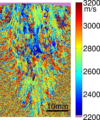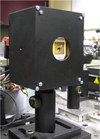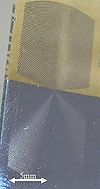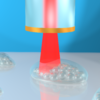Difference between revisions of "Laser ultrasonics"
From Applied Optics Wiki
m |
|||
| (One intermediate revision by one other user not shown) | |||
| Line 4: | Line 4: | ||
|- | |- | ||
| [[SRAS for materials characterisation]] | | [[SRAS for materials characterisation]] | ||
| − | | Spatially Resolved Acoustic Spectroscopy | + | | Spatially Resolved Acoustic Spectroscopy is a technique for mapping a material's surface acoustic wave velocity. SRAS measurements can be used to determine the crystallographic orientation and elastic constants of a material. |
| [[Image:SRAS_300dpi_sras_austenitic_ss.png | 100px]] | | [[Image:SRAS_300dpi_sras_austenitic_ss.png | 100px]] | ||
|- | |- | ||
| Line 42: | Line 42: | ||
| We have created new ultrasonic transducers operating at the nanoscale with frequencies in the gigahertz range and with wavelengths smaller than those of visible light. These will enable the diagnostic power of ultrasonics to be used at the nanoscale. | | We have created new ultrasonic transducers operating at the nanoscale with frequencies in the gigahertz range and with wavelengths smaller than those of visible light. These will enable the diagnostic power of ultrasonics to be used at the nanoscale. | ||
| [[Image:BNC_hair2highlightred.PNG | 100px]] | | [[Image:BNC_hair2highlightred.PNG | 100px]] | ||
| − | |||
| − | |||
| − | |||
| − | |||
| − | |||
| − | |||
|- | |- | ||
Latest revision as of 21:57, 8 January 2022
Laser ultrasonics
| SRAS for materials characterisation | Spatially Resolved Acoustic Spectroscopy is a technique for mapping a material's surface acoustic wave velocity. SRAS measurements can be used to determine the crystallographic orientation and elastic constants of a material. | 
|
| NDE for AM | We are developing technologies for additive manufacturing to enable online inspection to montior material properties and presence of defects while the part is being constructed. | 
|
| Cell Imaging Using Picosecond Ultrasonics | We have been developing an instrument for imaging the acoustic properties of living cells using high frequency ultrasound. We have taken the first images of living cells using the picosecond laser ultrasound technique | 
|
| Super-resolution imaging using nano-bells | We have demonstrated that metallic nanostructures can be super-localised by measuring their acoustic vibrations | 
|
| Exotic Ultrasonics for the real world | We have developed a custom CMOS linear array detector for picosecond ultrasound measurements. Performing many measurements in parallel allows us to dramatically reduce the time it takes to perform each measurement. | 
|
| Cheap Optical Transducers | This is a new breed of ultrasonic transducers that are activated and read optically. CHOTs offer a range of advantages over the traditional contact transducers: remote, reliable, couplant free operation with low impact on the inspected structure, activated by light and eliminating the need of wires. | 
|
| Nanoscale Ultrasonic Transducers | We have created new ultrasonic transducers operating at the nanoscale with frequencies in the gigahertz range and with wavelengths smaller than those of visible light. These will enable the diagnostic power of ultrasonics to be used at the nanoscale. | 
|
| High frequency ultrasonics using optical fibres | We have developed ultrasonic transducers that sit on the tip of a hair-thin optical fibre, which can be used for endoscopic spectroscopy and imaging in biomedical and industrial settings. | 
|
| Nanoparticle acoustic transducers | We are developing spherical acoustic transducers operating at the nanoscale with frequencies in the gigahertz range and with wavelengths smaller than those of visible light. | 
|